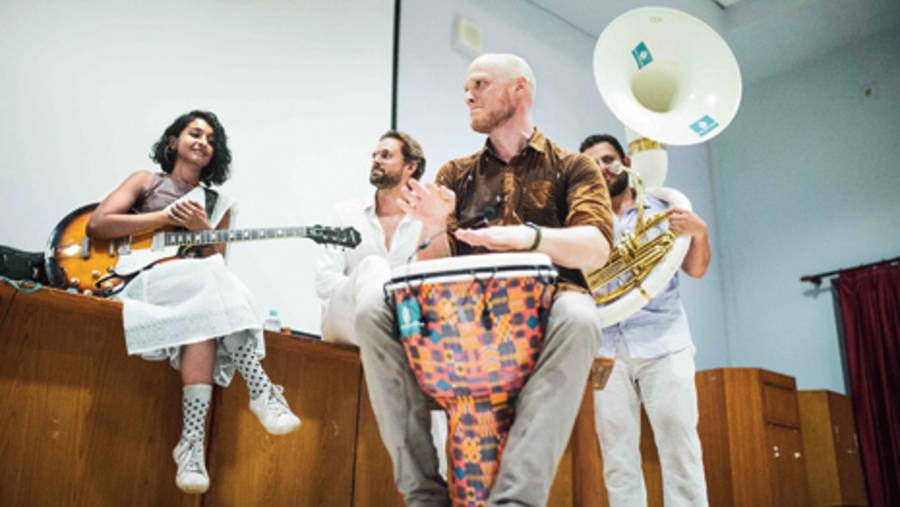The band Faraway Friends took shape in 2019 when Goa-based folk singer Ditty met Keno (Germany) and David Raddish (Austria) by the river Ganges. The three were on a project trip organised by Viva con Agua, an NGO that promotes human right to water. Their conversations gave birth to Rain Is Coming, an album set to release on World Water Day —March 22, in 2021.
To mark the release of the album the trio launched their debut single Jal saheli, on November 13, a song dedicated to Women Water Warriors of North India who repair and create old water harvesting systems to provide clean water for their regions and villages where water is scarce.
A chat with Ditty.
Congratulations on Jal saheli and the Rain Is Coming record. Are you excited about spreading the message of water conservation and the effort you’ve put into it?
Yes totally! I’m very happy that I was able to make a record like this with people from different parts of the world and that we’re making music for a cause. It’s really nice.
How does Jal saheli set the tone for the intent behind the music and the label Viva con Agua Music?
The song Jal saheli is special because it is about the women going out and revolting against patriarchy. They are doing all the work on the ground. These women are repairing old indigenous traditional water harvesting structures and they form these communities where they share knowledge with other women from the village and dig these ponds. They realise they don’t have water and can do something about this by being active. This song is addressing these women. It is a special one.
Could you tell us a little about your experiences with them?
The idea of the trip by Viva con Agua is that they bring a lot of artistes from outside and engage with the people from the village. The aim of the trip is to get along with the people and celebrate their victory and encourage them through music and performances. It’s quite wonderful and they are thrilled to be a part of it. To see people coming from outside and appreciate them is breaking boundaries and borders.

The artwork of Jal saheli done by Kruttika Susarla and Christoph Knopf Sourced by the correspondent
The song is really empowering and inspired. How have they influenced you?
I am a total eco-feminist. A lot of today’s problems in the world are present because capitalism and patriarchy are interlinked and control the way we live. I am inspired by all women who stand up for themselves and change things. They are not afraid, they are proud of the work they do. It’s amazing, given the situation they live in, where they don’t have the basics in life, like water, and they go out to do this.
Along with your voice and the music done by David and Keno we can hear the sound of water, there are some women in the background chanting and also a speech. Are these recorded from the travels during the project trip with Viva con Agua?
The album started with David as he was recording samples... the sounds of water and people chanting, trains and more and framing them into instruments. David and Keno had a chat and we were going to work on this one project which became bigger, so now it’s a full album.

The artwork of Rain Is Coming done by Kruttika Susarla and Christoph Knopf Sourced by the correspondent
‘Rain is Coming is about our human stories, our global yet unified journeys and how they inspire social change.’ What other stories, journeys and social changes is Rain Is Coming tapping into?
It is directly inspired by this one experience which is the north of India water-based project but it touches on many other things and ideas that we spoke about the night we met. We discussed about the things we cared and felt about. A lot of it was about the state of the planet, human condition and suffering, discrimination, segregation in society, empowerment, power of communities… it touches upon a lot of these topics.
Being an urban ecologist by day and musician by night, a lot of your songs revolve around saving the environment. How strongly do you believe that music could be used as a tool for change?
I get asked this question a lot (laughs). I think I have a voice that I am more aware of everyday and people like you interview me and people listen to the music. I want to use the space for something good and there is not enough space in the art world for such topics. We shut our eyes. Every time I watch the documentary, I’m in tears just realising where we come from. We are constantly in these bubbles and we shut our eyes to poverty and segregation. I hope there is more space for these topics and conversations about such things and music can make that happen.











